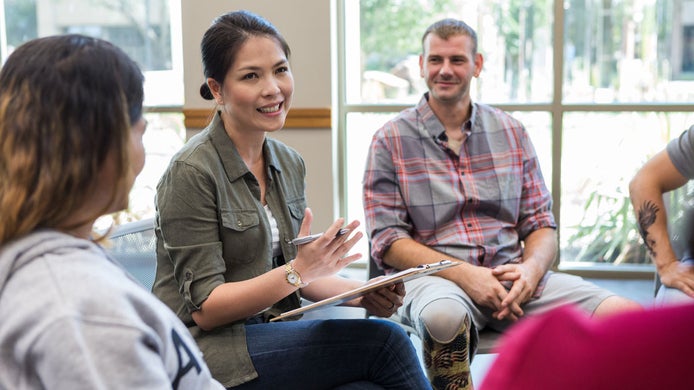Explore our resources for psychology and counseling degrees and learn about career options that fit your future.

Psychology is a diverse field with various specialties, each offering unique career paths based on your interests and who you want to help. For example, a traditional clinical psychologist role might appeal to you if you envision yourself working one-on-one with adults. Alternatively, if you’re passionate about supporting young clients with their emotional and mental health, becoming a child psychologist could be a fulfilling choice.
To simplify your decision-making, consider the environments and populations you are most interested in. If working with children or in a school setting excites you, exploring the role of a school psychologist might be a great starting point. So, what exactly does a school psychologist do?
What Is a School Psychologist?
To gain a better understanding of this field, let's start with a simple job description of a school psychologist. These professionals are trained to recognize, address, and tackle learning and behavioral needs in school-aged children.
School psychologists have a wide range of responsibilities, primarily working in academic institutions and focusing on students of all ages, from elementary school through college. They offer comprehensive psychological services to help students succeed academically, socially, behaviorally, and emotionally.
Typical services they provide include assisting students who are bullied, students with disabilities, and students who struggle with issues such as poor academic performance, problems at home, or mental health challenges.
School Psychologist vs. School Counselor
The roles of school psychologists and school counselors have some similarities, but they also have significant differences. School psychologists mainly focus on assessing and testing students for additional services, addressing individual developmental and mental health issues, and determining special education needs. School counselors work with the entire student population, providing crisis intervention, and preparing students for their future educational and professional experiences. This involves spending more time on mental health, emotional intelligence, and academic achievement connections.
Where Do School Psychologists Work?
According to the National Association of School Psychologists (NASP), 81 percent of school psychologists work in K-12 public schools. The remaining 19 percent are employed in private schools, community health organizations, and universities. Most school psychologists work full-time during regular business hours Monday through Friday.
Depending on the role, your practice could include elementary school students who can’t yet read or write or college freshmen facing the unique problems of young adults.
Daily School Psychologist Responsibilities
School psychologists have an unpredictable daily schedule. Dr. Maureen Dalman-Schroeder, a former part-time assistant professor at UMass Global and California delegate of the National Association of School Psychologists (NASP), says that her day may start with a set schedule but could change due to unexpected events. She explains that her daily tasks may include conducting threat assessments, administering tests to students, providing individual counseling, working with students dealing with severe anxiety, and helping parents understand their child's behavior.
School psychologists mainly work with students but also collaborate with teachers, parents, and school counselors. They often work closely with special education teachers to develop individualized education plans (IEPs) and monitor student progress. Communicating and cooperating with others is crucial in this role. Dr. Dalman-Schroeder emphasizes that flexibility, patience, and openness to change are essential for excelling in this field.
Essential School Psychologist Skills
School psychologists are experts in addressing issues that commonly arise in school-age children, with a role that extends beyond traditional psychological practice. Their diverse skill set is crucial for supporting students, educators, and parents alike within educational settings. While psychologists of all kinds share many overlapping competencies, school psychologists must master a specific range of skills to effectively navigate the complex landscape of educational and psychological needs. These essential skills include:
- Mental Health Expertise: Understanding and addressing various mental health concerns in children and adolescents.
- Effective Communication: Ensuring advice and findings are clearly understood, and distilling complex ideas into actionable steps for students, parents, and educators.
- Problem-Solving: Identifying issues, developing solutions, and assessing their effectiveness to navigate challenges for practical outcomes.
- Knowledge of Psychological Theory and Practice: Providing a foundation for assessments and interventions, including an understanding of human behavior and therapeutic techniques.
- Conducting Psycho-Educational Assessments: Analyzing data to support students facing academic hurdles and making informed decisions on educational requirements.
- Creating Individualized Education Programs (IEPs): Designing personalized plans for students with disabilities to ensure equal academic opportunities.
- Behavioral Health Management: Developing strategies to improve and maintain positive behaviors in the school environment.
- Special Education Knowledge: Understanding the unique needs of students with diverse learning abilities.
- Treatment Planning Abilities: Developing comprehensive plans to address identified issues.
How to Become a School Psychologist
If the idea of helping students overcome obstacles and succeed in life and school inspires you, you might be wondering how to become a school psychologist. The first step on the journey is an advanced degree — you won’t be eligible to obtain proper licensure to practice without one. You can begin your studies with a bachelor’s degree in a relevant subject, such as psychology or education, to gauge your interest in the field.
In most states, though, you’ll need a graduate degree to qualify for licensure. You typically need an Education Specialist in School Psychology degree. Some may choose an emphasis on autism, applied behavior analysis, or other relevant subfields.
Once you’ve earned your advanced degree, you can then apply for your license. School psychologist requirements vary from state to state. Be sure to check specifics in your area. In most states, schools are credentialed by the Department of Education.
How to Become a School Psychologist in California
In California, the requirements to become a licensed school psychologist are specific and detailed. Here’s a step-by-step guide to understanding the process:
- Obtain a bachelor’s degree in psychology, education, or a related field. Complete a graduate program in school psychology that includes at least 60 semester hours of coursework.
- Complete a supervised internship consisting of at least 1,200 hours, with at least 600 hours completed in a school setting.
- Pass the Licensed Educational Psychology (LEP) written exam, which is offered annually. After passing the exam, you must request your license and pay the initial license fee within one year.
- Obtain an LEP license within one year of passing the written exam
- Some districts may have additional requirements, such as background checks or additional training, so it's important to check with the specific district where you plan to work.
School Psychologist Career Outlook and Salary
Your main motivation for becoming a school psychologist might not be money, but it’s still an important factor to consider. A career that’s both personally fulfilling and financially rewarding can be difficult to come by, but school psychologists can have the best of both worlds.
As of May 2024, the average annual pay for a school psychologist in California is $109,082. However, salaries can range from $76,810 to $136,588, with most earning between $92,190 and $123,480. Salary ranges can vary widely depending on many important factors, including education, certifications, additional skills, and experience levels.
Moreover, the setting in which you work—whether in public or private schools—can also influence your salary. Typically, public school psychologists may have access to more comprehensive benefits packages, including pensions and health insurance, which can add significant value to their total compensation. On the other hand, private school psychologists might see salary fluctuations influenced by the institution's resources and funding.
Begin a School Psychologist Career
A career as a school psychologist is both personally fulfilling and financially rewarding. School psychologists work closely with students, parents, and teachers to advocate for children with behavioral, mental, and emotional disorders, ensuring an equitable learning environment.
If this career path inspires you, explore the educational specialist degrees from UMass Global’s School of Education to start your journey toward becoming a school psychologist.








